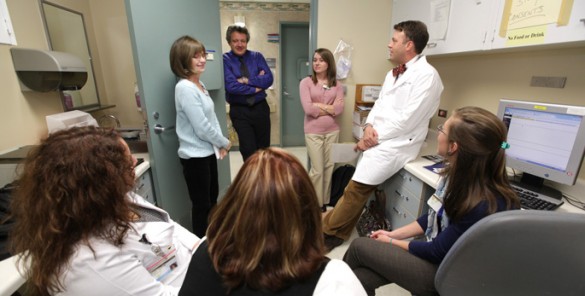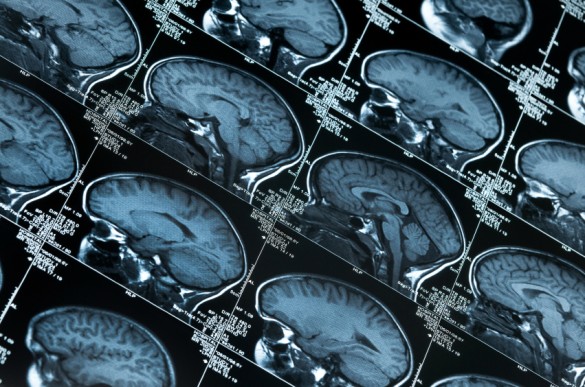The Vanderbilt University Medical Center (VUMC) Huntington’s Disease Clinic is one of only four in the nation to receive a Level 1 Center of Excellence designation.
The achievement comes after VUMC collaborated with Erlanger Health System and Cole Neuroscience Center Movement Disorders Clinic to launch clinics in Chattanooga and Knoxville.
The Level 1 designation from the Huntington’s Disease Society of America (HDSA) requires a minimum of 150 patients and forming collaborations to expand access to care — after having already established a multidisciplinary team committed to addressing the needs of people affected by the genetic neurodegenerative disorder.

The collaboration will make it easier for people to get specialized care and support, said Daniel Claassen, M.D., M.S., associate professor of Neurology and clinic director.
“We looked at where patients were coming from, based on their ZIP codes, and realized that if we could create centers in Knoxville and Chattanooga we could substantially improve the access of care for these families,” Claassen said, noting that many of these patients were driving hundreds of miles to receive care at VUMC.
Huntington’s disease is a fatal genetic disorder caused by the progressive breakdown of nerve cells in the brain. Children of a parent with the disease have a 50/50 chance of inheriting the faulty gene and developing the disease.
There is currently no cure or effective drug treatment approved for Huntington’s disease, but VUMC is participating in clinical trials that aim to slow the progression of the disease, improve associated symptoms, and potentially treat it.
“We and a couple of places around the United States are involved in a Phase 1 safety and tolerability genetic medicine study assessing an allele specific antisense oligonucleotide (ASO),” Claassen said. “We are testing the hypothesis that this therapy will prevent transcription of the mutant Huntington’s disease gene into the mutant Huntington protein.”
Vanderbilt researchers are testing two other compounds that may slow progression of the disease. Other researchers are also exploring genome-editing techniques, such as CRISPR, for Huntington’s disease therapies.
“My clinical suspicion is that in the next three to four years we are going to have an explosion of interest in these types of studies, which ultimately are trying to change the expression of the mutant Huntington’s gene,” Claassen said.
“There are various ways you could potentially do it, and various methods to deliver these therapies. Our Huntington’s disease clinic will definitely be at the forefront of these important trials.”
More than 200 people with Huntington’s disease rely on the VUMC clinic for care. The clinic is staffed by a neurologist, psychiatrist, palliative care specialist, genetic counselor, social worker, psychologist, physical therapist, occupational therapist, speech-language pathologist, dietitian, nurses and other support personnel.
“We deal with life issues that can begin at age 16, all the way to age 60 and above,” said Lisa Hale, LMSW, the clinic’s social worker.
She counsels families affected by Huntington’s disease as they live with the burden of symptoms, seek resources that improve care and make care decisions about loved ones. The clinic maintains a help line to assist families.
VUMC and the Tennessee Chapter of the HDSA are hosting a Family Education Day from 1 to 5 p.m. Saturday, Sept. 16, in the theater on the second floor of Monroe Carell Jr. Children’s Hospital at Vanderbilt. Claassen will speak, along with Mary Edmondson, M.D., medical director of HD Reach, and Michael de Riesthal, Ph.D., director of Pi Beta Phi Rehabilitation Institute at the Vanderbilt Bill Wilkerson Center.
“Our key objective is to support, educate and inform our patients, our caregivers and our family members about what we have within our Center of Excellence,” Hale said. “We will be talking about advocacy. We will be talking about research.”
The clinic collaboration between VUMC, Erlanger Health System and Cole Neuroscience Center Movement Disorders Clinic received funding support from the HDSA. The clinics in Chattanooga and Knoxville are designated Level 1 through their affiliation with VUMC.
The other Level 1 HDSA Centers of Excellence are at University of California Davis Medical Center in Sacramento, University of Washington in Seattle and Hennepin County Medical Center in Minneapolis.















